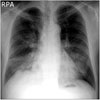Abstract
A 60-year-old man was diagnosed with stage IV squamous cell carcinoma of lung and treated with weekly doses of docetaxel and cisplatin. Tumor mass and mediastinal lymphadenopathy disappeared after 4.5 cycles of chemotherapy. At one week post final chemotherapy, the patients developed sudden shortness of breath. New, multifocal infiltrations developed on both lungs without definitive evidence of infection. Despite administration of broad spectrum antibiotics, the lung lesion did not improve, so bronchoalveolar lavage and computed tomography-guided lung biopsy were performed. The proportion of lymphocytes was increased markedly and histopathology revealed squamous cell carcinoma combined with bronchiolitis obliterans organizing pneumonia. After high dose corticosteroid therapy, dyspnea and the newly developed consolidation had decreased slightly. However, dyspnea and hypoxemia increased again because of aggravated lung cancer since chemotherapy had stopped. Chemotherapy couldn't be restarted due to the poor performance status of the patient. Later, patient died of respiratory failure from poor general condition and progression of lung cancer.
Figures and Tables
 | Figure 2Chest CT shows luminal narrowing of right lower lobe bronchus, interlobular septal thickening, peribronchial consolidation on right lower lobe and bilateral pleural effusion. |
 | Figure 3Chest CT shows improved luminal narrowing of right lower lobe bronchus, nearly disappeared right lower lobe consolidation and pleural effusion. |
 | Figure 4Radiographic findings after development of dyspnea. Chest X-ray (A) and chest CT (B) show multifocal patchy consolidations on the right lung. |
 | Figure 5The microscopic finding of needle biopsied lung tissue reveals plugging of loose fibrotic material in small airway and alveolar spaces (right side) and a few squamous cell carcinoma nests are also noted with artificial craft formation (left box) (H&E stain, ×40) (Inlet: higher magnification of left box, H&E stain, ×200). |
References
1. Pavlakis N, Bell DR, Millward MJ, Levi JA. Fatal pulmonary toxicity resulting from treatment with gemcitabine. Cancer. 1997. 80:286–291.
2. Merad M, Le Cesne A, Baldeyrou P, Mesurolle B, Le Chevalier T. Docetaxel and interstitial pulmonary injury. Ann Oncol. 1997. 8:191–194.
3. Takeda K, Negoro S, Tamura T, Nishiwaki Y, Kudoh S, Yokota S, et al. Phase III trial of docetaxel plus gemcitabine versus docetaxel in second-line treatment for non-small-cell lung cancer: results of a Japan Clinical Oncology Group trial (JCOG0104). Ann Oncol. 2009. 20:835–841.
4. Taxane-induced pulmonary toxicity. UpToDate version 14.3. [Internet]. c2010. cited 2010 Oct 8. Waltham: UpToDate Inc.;Available from: http://www.uptodate.com.
5. Ravdin PM, Burris HA 3rd, Cook G, Eisenberg P, Kane M, Bierman WA, et al. Phase II trial of docetaxel in advanced anthracycline-resistant or anthracenedione-resistant breast cancer. J Clin Oncol. 1995. 13:2879–2885.
6. Kouroussis C, Mavroudis D, Kakolyris S, Voloudaki A, Kalbakis K, Souglakos J, et al. High incidence of pulmonary toxicity of weekly docetaxel and gemcitabine in patients with non-small cell lung cancer: results of a dose-finding study. Lung cancer. 2004. 44:363–368.
7. Chen YM, Shih JF, Perng RP, Tsai CM, Whang-Peng J. A randomized trial of different docetaxel schedules in non-small cell lung cancer patients who failed previous platinum-based chemotherapy. Chest. 2006. 129:1031–1038.
8. Onishi H, Kuriyama K, Yamaguchi M, Komiyama T, Tanaka S, Araki T, et al. Concurrent two-dimensional radiotherapy and weekly docetaxel in the treatment of stage III non-small cell lung cancer: a good local response but no good survival due to radiation pneumonitis. Lung cancer. 2003. 40:79–84.
9. Dunsford ML, Mead GM, Bateman AC, Cook T, Tung K. Severe pulmonary toxicity in patients treated with a combination of docetaxel and gemcitabine for metastatic transitional cell carcinoma. Ann Oncol. 1999. 10:943–947.
10. Read WL, Mortimer JE, Picus J. Severe interstitial pneumonitis associated with docetaxel administration. Cancer. 2002. 94:847–853.
11. Veltkamp SA, Meerum Terwogt JM, van den Heuvel MM, van Boven HH, Schellens JH, Rodenhuis S. Severe pulmonary toxicity in patients with leiomyosarcoma after treatment with gemcitabine and docetaxel. Invest New Drugs. 2007. 25:279–281.
12. Epler GR, Colby TV, McLoud TC, Carrington CB, Gaensler EA. Bronchiolitis obliterans organizing pneumonia. N Engl J Med. 1985. 312:152–158.
13. Santrach PJ, Askin FB, Wells RJ, Azizkhan RG, Merten DF. Nodular form of bleomycin-related pulmonary injury in patients with osteogenic sarcoma. Cancer. 1989. 64:806–811.
14. Jacobs C, Slade M, Lavery B. Doxorubicin and BOOP. A possible near fatal association. Clin Oncol (R Coll Radiol). 2002. 14:262.
15. Lazor R, Vandevenne A, Pelletier A, Leclerc P, Court-Fortune I, Cordier JF. The Groupe d'Etudes et de Recherche sur les Maladles "Orphelines" Pulmonaires (GERM"O"P). Cryptogenic organizing pneumonia Characteristics of relapses in a series of 48 patients. Am J Respir Crit Care Med. 2000. 162:571–577.




 PDF
PDF ePub
ePub Citation
Citation Print
Print




 XML Download
XML Download